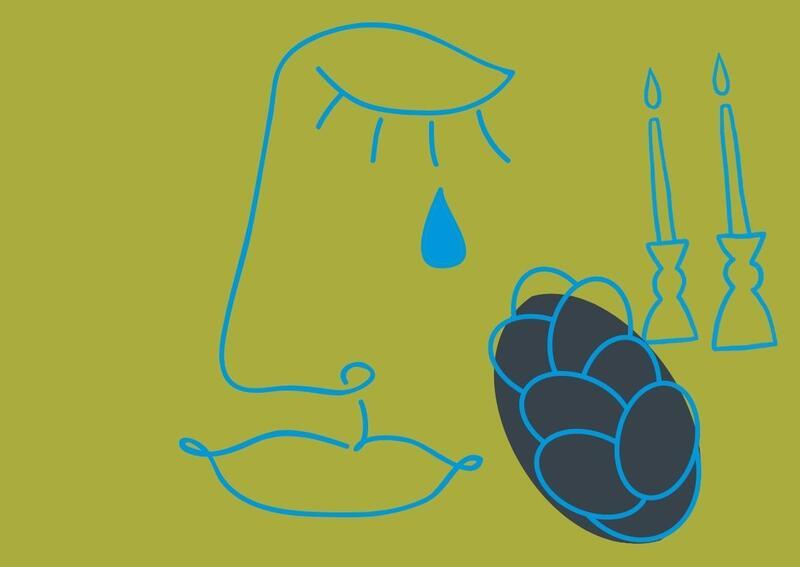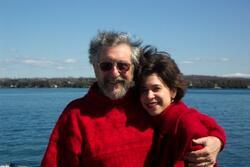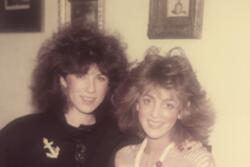Grief Made Me an Outsider, but Shabbat Drew Me In: How Judaism Helps Me Make Sense of Loss
A lot of teenagers start high school feeling insecure and self-conscious—different from everyone else, not good enough, worried about what the future may hold—until they find a group that feels right.
My circumstances were different.
When I started high school, I felt like an outsider, looking through a hazy window of grief at a world that no longer made sense. I felt as if I was simultaneously watching life happen without me and being forced to keep moving with it, pushed to the margins of normal teenage life.
On April 9th, 2018, my father died unexpectedly of sudden cardiac death. Life since then has been, in simple terms, more complicated than I could have ever anticipated. Grief has become the disorienting reality which underlies every aspect of my existence as I grapple with living in a world without my dad; it’s become the source of an abundance of love and an abundance of pain, wrapped into one immense, beautiful, and devastating experience.
The first year after my dad died, I'd yet to understand the depths of this new normal. In my fog of confusion and shock, time felt like it was spinning out of control. I felt like a shell of the person I used to be and wanted to be; like I was drifting without an anchor, unsure of how to respond. Walking through the halls of my high school, I had a strange sensation that my real life—the life where I knew how to make sense of what was happening to me—was taking place elsewhere, far away from the confines of monotonous seven-hour schooldays. I felt that I had no community and no sense of belonging: no one to recognize me and the grief that had indescribably consumed me.
Until, that is, Shabbat.
Shabbat at synagogue was the one place where my grief did belong, where I belonged—the one place in which I learned to process the complexity of my new reality. Shabbat was where I felt my father’s presence as my family sat together in the fourth row, as we used to when there were five of us. Sometimes that presence was comforting and sometimes it was torturous, but it always made me feel complete. Shabbat was where I, for the first time during the week, felt my own presence, when I chanted Oseh Shalom and went up to the bima to play the violin for L’cha Dodi. Shabbat was my anchor, where it became clear to me that intense sadness and joy could, eventually, exist beside each other, just as they did in Jewish prayer and in my Jewish community. Shabbat was not monotonous. It was beautiful.
The first Shabbat after my father died was when I initially understood the significance that these services would have for me. That Friday was unusual: the rabbi was simultaneously naming a newborn baby, celebrating a couple’s upcoming marriage, and commemorating the sudden death of my father. My family could feel our community’s embrace as we sat through a service which encapsulated every stage of the human cycle: life, love, and loss. Sitting there, I cried for the first time after my father had died and felt a semblance of gratitude for the first time, too. When it came time to stand for the Mourner’s Kaddish, I remember thinking to myself that soon I’d have this prayer memorized after repeating it every week. And, in the middle of this thought—in a moment I remember so vividly almost four years later—I looked around at others in the temple, and I realized that so many of them were reciting it from memory already.
At that moment, I knew for the first time that I was not and would not be alone. I felt a preview of what I now feel at synagogue every time I go: that this is the rare place in which my grief will always be recognized and accepted, the rare place in which my grief belongs as a part of a larger, compassionate community.
The first year after my father died, I lived a dichotomous existence. For six days of the week, I remained numb to my family’s loss, stuck in the dull, empty reality of school and day-to-day life which barred me from processing my pain or connecting with anyone who could relate to it. Each Friday, however, I emerged from this rubble and opened my eyes to the world right in front of me. For 90 minutes on Shabbat, I sat as part of a community which embraced me and my family while we navigated the profound intensity of our emotions: the highs, the lows, the uncertainty, and the sorrow. The Jewish values of questioning, of wrestling, and of perseverance propelled me forward for months. Until, miraculously, they propelled me forward so much that those 90 minutes of recognition and belonging on Shabbat turned into seven full days where I could openly and truly be myself everywhere.
I miss my father every second of every day, and this loss is embedded into each aspect of my life. I don’t think that will ever change and, to be frank, I don’t want it to: when grief is all you have left of the person you love, it becomes a lifeline, a part of who you are. This part of me is heartbreaking and beautiful and indescribable and I wish every day that it didn’t need to exist, but it does—and I have Judaism and my Jewish community to thank for empowering me to feel all of it in its complex totality.
Now I know how incredible it is to be able to sit in my sorrow and grief in community, so much so that even when I’m truly all alone, I still feel part of something bigger than myself. My pain will never go away, but it now has a community that will always be there to help me through it. I first felt this on Shabbat, and I feel it now throughout the week.
Grief is eternal, because love is eternal; because of Judaism, I no longer feel alone.
This piece was written as part of JWA’s Rising Voices Fellowship.







